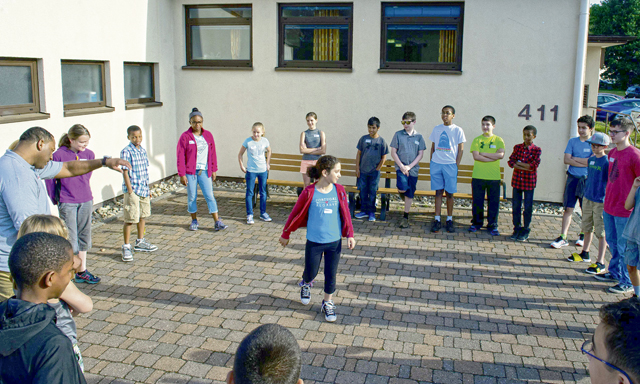
July 11 on Ramstein. The game’s premise is to have kids learn the name of the peer next to them in the circle, and if they can’t remember it in time, they must be in the middle. This was one of several activities the children took part in during the beginning of the youth camp to become familiar with one another.
For most kids, once school is out for the summer, it’s all about vacations and staying up late playing video games until the next school year comes around.
But those who attended the Science, Technology, Engineering and Mathematics youth camp July 11 to 16 on Ramstein, their summers involved coding computer programs, constructing robots, 3-D printing and more.
For five days, kids ranging from sixth through eighth grade challenged themselves in a STEM youth camp. According to Monty Bussey, 86th Force Support Squadron teen program coordinator, the topics they learned about are ones that have a large impact on society.
“Throughout this camp, we are encouraging kids to develop a heightened sense of learning in some big school topics,” Bussey said. “As Americans, we are falling behind in these areas (science, technology, engineering and mathematics). Getting kids involved in these subjects will hopefully inspire them and others to not only gain more knowledge but also possibly pursue a career in these fields.”
From drones to toy railroad systems, the camp encouraged the kids to think outside the box and stay open minded.
According to Bussey, the camp couldn’t have been successful without having fun.
“As the person that oversaw these kids, I was looking for different ways to keep things fun to help the kids learn,” Bussey said. “Kids would look forward to learning new things every day. … Our goal was to leave these kids as motivated young men and women and increase their interest in STEM.”
Some of the ways they did this was by taking normal hobbies, toys or aspects of children’s daily lives and demonstrating how those were made.
“Another goal of ours was to get kids off video games and, instead, learning how to code or design one,” Bussey added. “We want them to become innovators of the future.”
However, Bussey couldn’t do this by just giving them the tools. He needed someone to teach the kids how to use these tools, and one of the people brought on board was Burkhard Link, 86th Force Support Squadron STEM engineering instructor.
“I teach principles of engineering and applied sciences at the University of Heidelberg,” Link said. “Here at the camp, I am leading the classes and activities for the kids to partake in.”
His role in the camp played a major part in helping the participants understand subjects and become interested, and according to Link, it’s been a worthwhile experience from his perspective.
“It’s been so much fun doing this,” Link said. “I’ve come to know the kids, and they are so creative. I always feel like I’m underrating them.”
For most children, once school comes back into session, getting into the flow of waking up early for class, having homework and studying might be challenging. For the kids that challenged themselves at the STEM camp, however, these aspects of school will be fresh in their heads and may even offer something new to share with their peers and inspire them to think outside the box.


